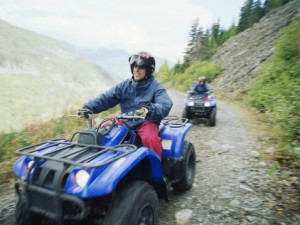- ATV accidents
- Brain Injuries
- Bus Accident
- Car Accidents
- Construction Accident
- Distracted Driving
- Drugged Driving Accident
- DUI
- Firm News
- Mass Tort
- Medical Malpractice
- Motorcycle Accidents
- Pedestrian Accidents
- Personal Injury
- Product Liability
- Safety
- Social Security Disability
- Truck Accidents
- Vehicle Accidents
- Workers Compensation
- Workplace Injuries

Riding recreational vehicles is a popular outdoor pursuit across Kentucky’s rugged terrain, but it can be extremely dangerous, especially for those who don’t wear helmets.
Riders who do not wear helmets are more likely to suffer severe traumatic brain injuries in crashes involving all-terrain vehicles, motorcycles and bicycles than those wearing helmets, a study shows.
The study, published in Advances in Preventive Medicine, was conducted at a trauma center in North Central Florida, where off-road recreational vehicles are popular. It focused on data from 482 child and adult patients, 75 percent of whom were males.
The researchers found that 36 percent of riders who weren’t wearing helmets when they crashed were admitted to the hospital’s intensive care unit, compared with 25 percent who were wearing helmets at the time of a wreck. In addition, hospital stays were about three times longer for those who weren’t helmeted.
The data are so stark that investigators are backing a call for more widespread injury prevention efforts and helmet safety and education.
Kentucky requires riders who are 16 and older to wear helmets on public property. Riders under 16 must wear helmets at all times.
Some riders balk at mandatory helmet laws, contending they cut into their personal freedom, cause inconvenience and increase the chance of spinal injuries. But ATVs weighing hundreds of pounds can easily roll over, throwing riders or landing on them.
The issue is important in Kentucky, which in 2007-2010 ranked third in the nation for ATV deaths with 122, according to the Consumer Product Safety Commission. Only West Virginia, with 148 deaths, and Texas, with 141, had more ATV fatalities.
Research shows that driver misuse and inappropriate behavior are the main causes of ATV fatalities and injuries.
Recreational vehicle use has increased over the past few years. ATVs are especially popular among the under-30 age group. However, riders without helmets are at an elevated risk of suffering traumatic brain injuries, a leading cause of injury-related death and disability nationwide.
The researchers found that abnormal bleeding on head CT scans was more common on non-helmeted patients. In abnormal CT scans of injured riders’ heads, 92 percent showed bleeding and 61.5 percent fractures.
In addition, the study showed helmeted riders remained hospitalized for 46 days compared with 144 days for non-helmeted riders.
ATVs are especially dangerous for children, with those under 16 accounting for 35 percent of fatalities and nearly half of all injuries, according to the Kentucky Office of Highway Safety.
To avoid injuries on ATVs, follow these tips:
- Complete an ATV driver training course.
- Use a helmet approved by the U.S. Department of Transportation, the American National Standards Institute or the Snell Memorial Foundation.
- Wear protective clothes.
- Do no ride on paved roads or unfamiliar terrain.
- Follow the ATV owner’s manual and keep the vehicle in good repair.
- Do not carry a passenger on a one-person ATV.
- Don’t ride in bad weather, on hazardous terrain or in insufficient light.
- Don’t perform risky stunts or drive at high speeds.
- Don’t ride under the influence of drugs or alcohol.
- Do not allow children to ride an adult ATV.
- Supervise child riders at all times.
Studies across the nation overwhelmingly support the use of helmets on bicycles, motorcycles and ATVs. Those who go without helmets put themselves at greater risk for life-altering brain injuries.

